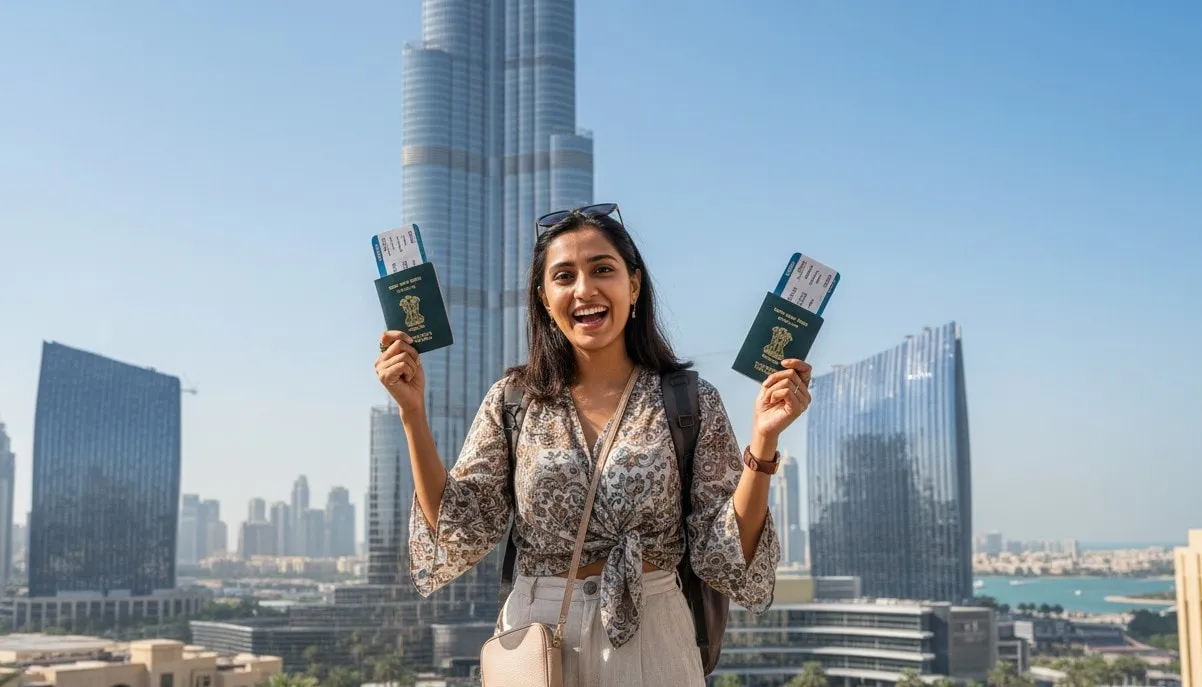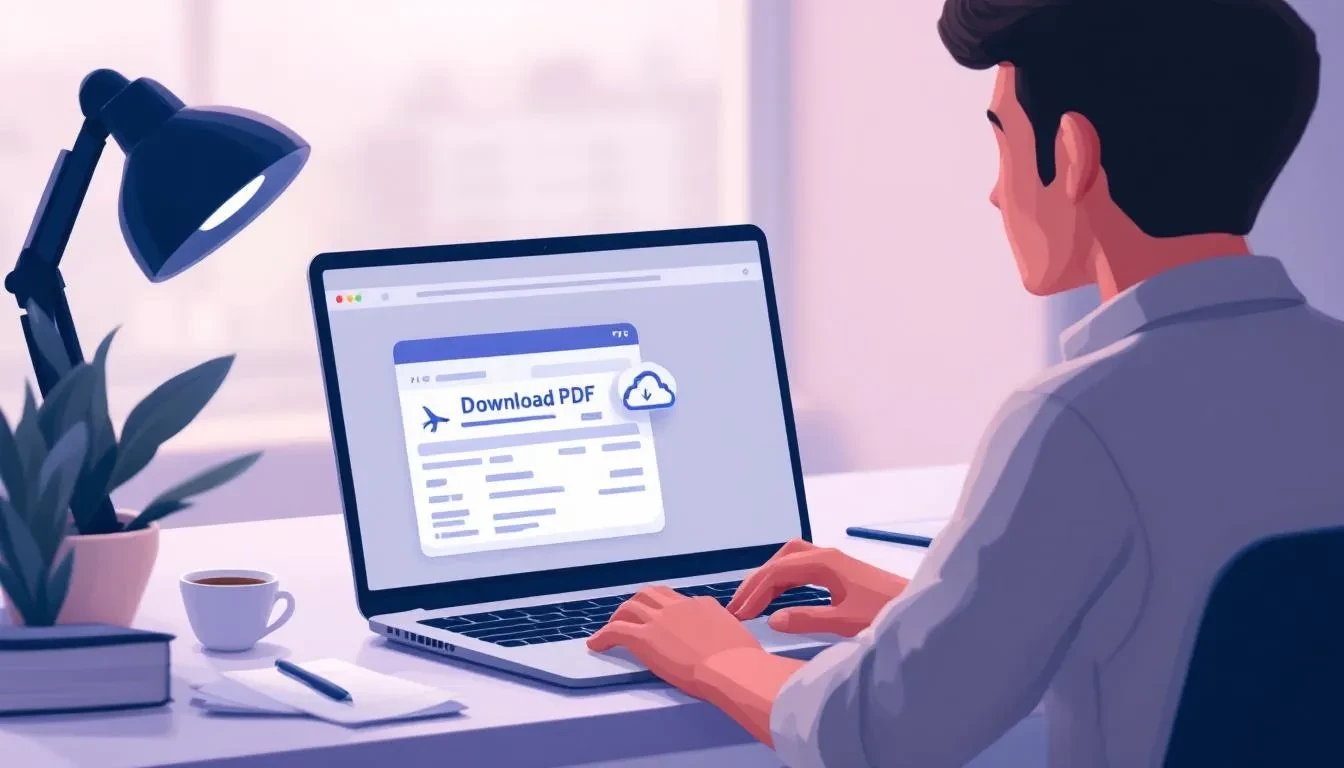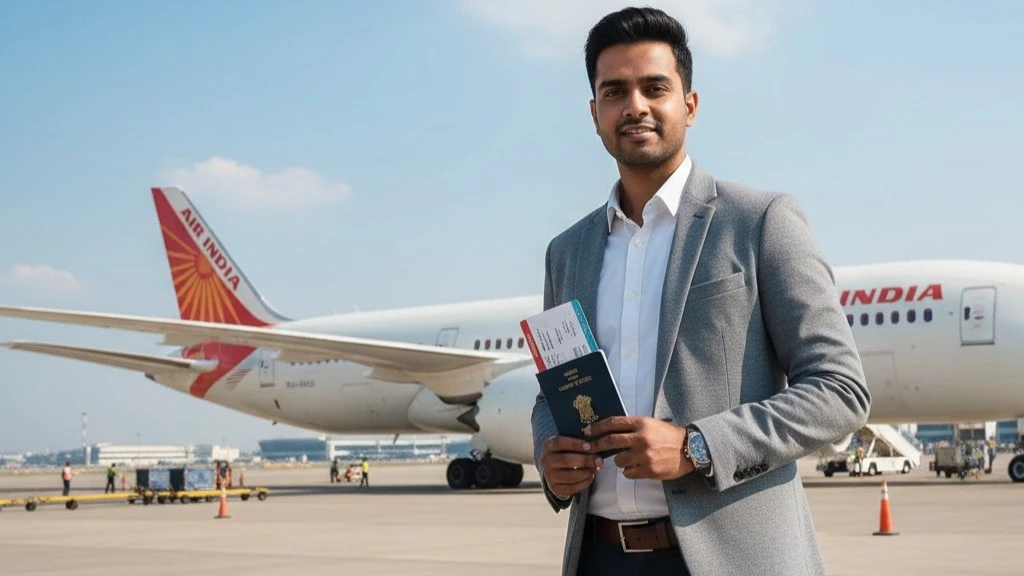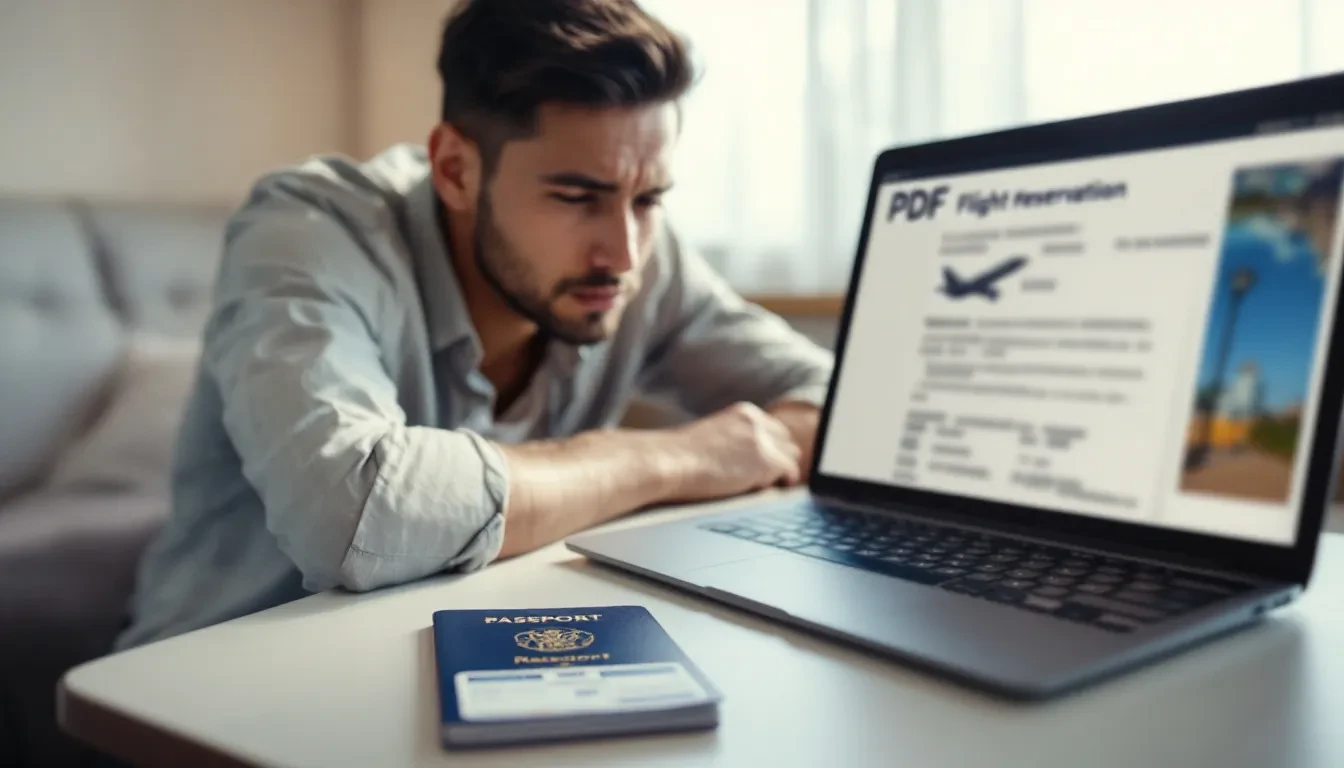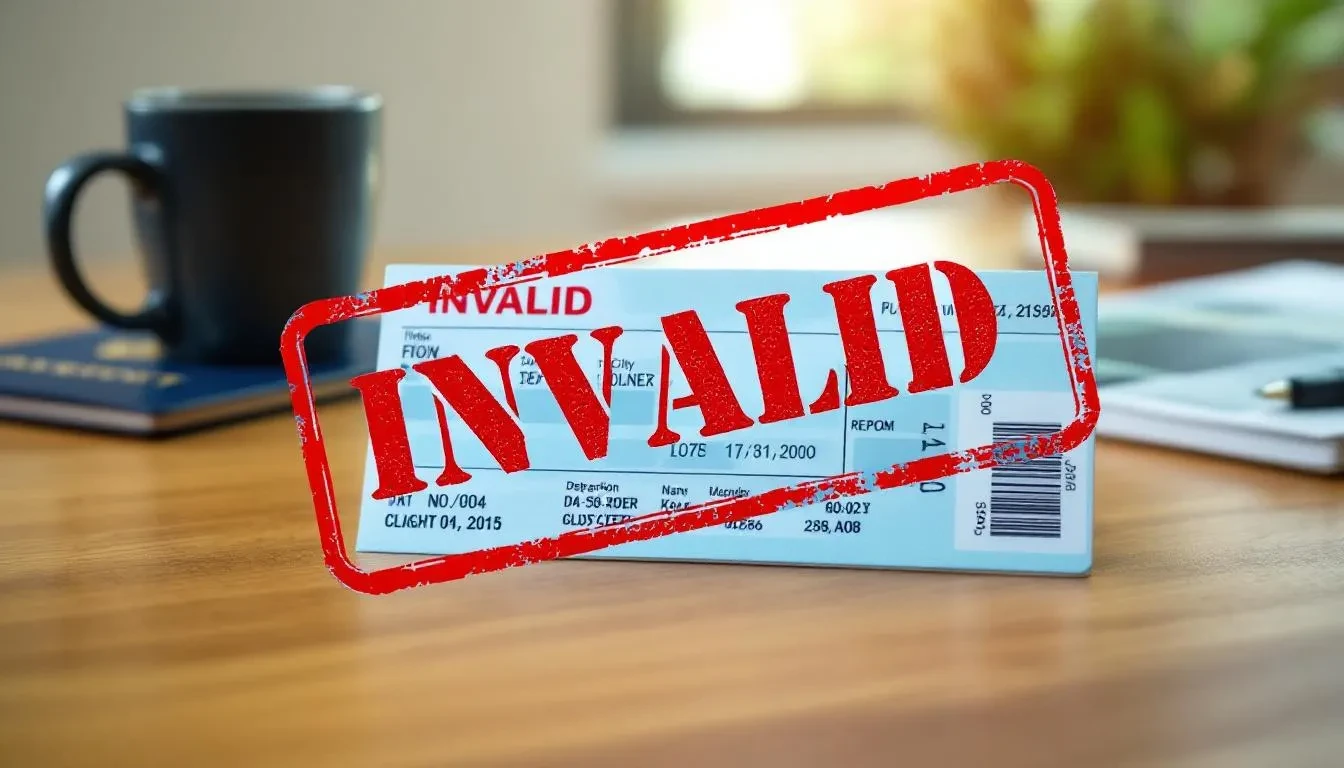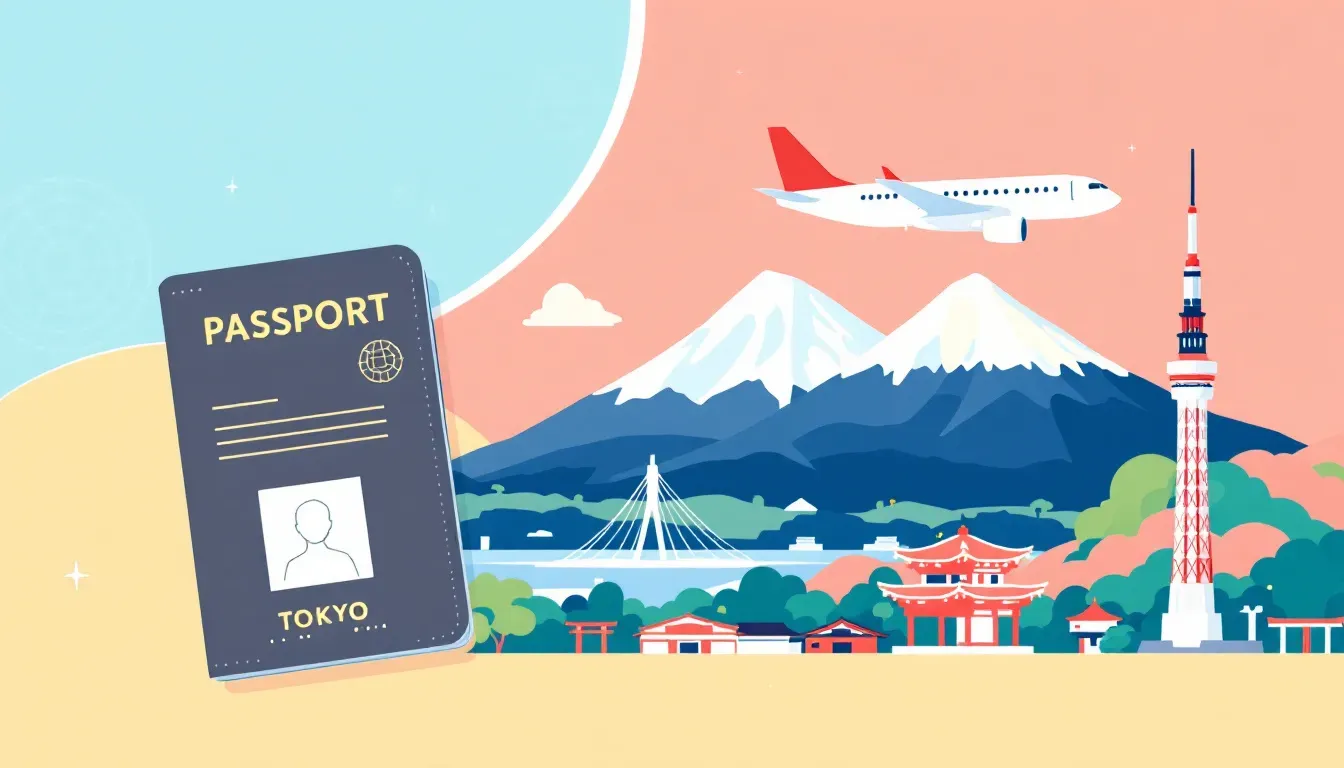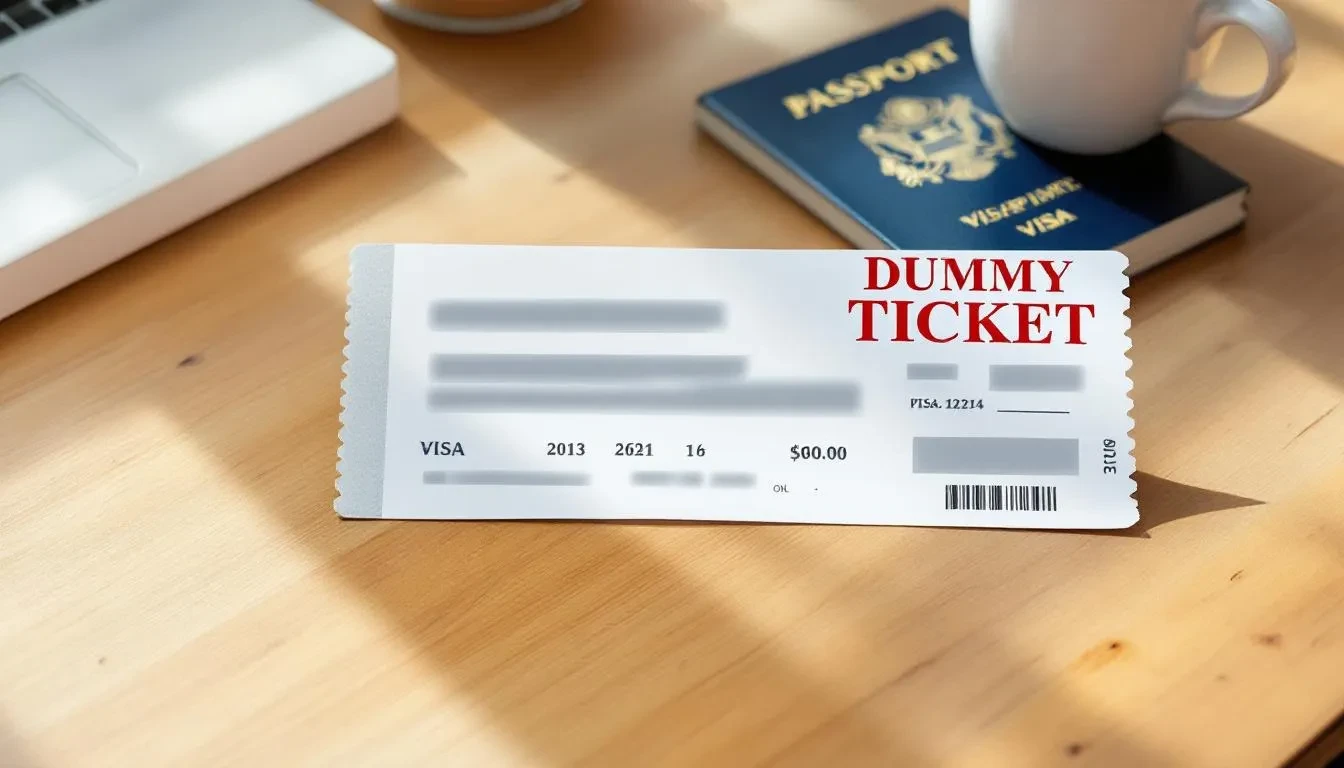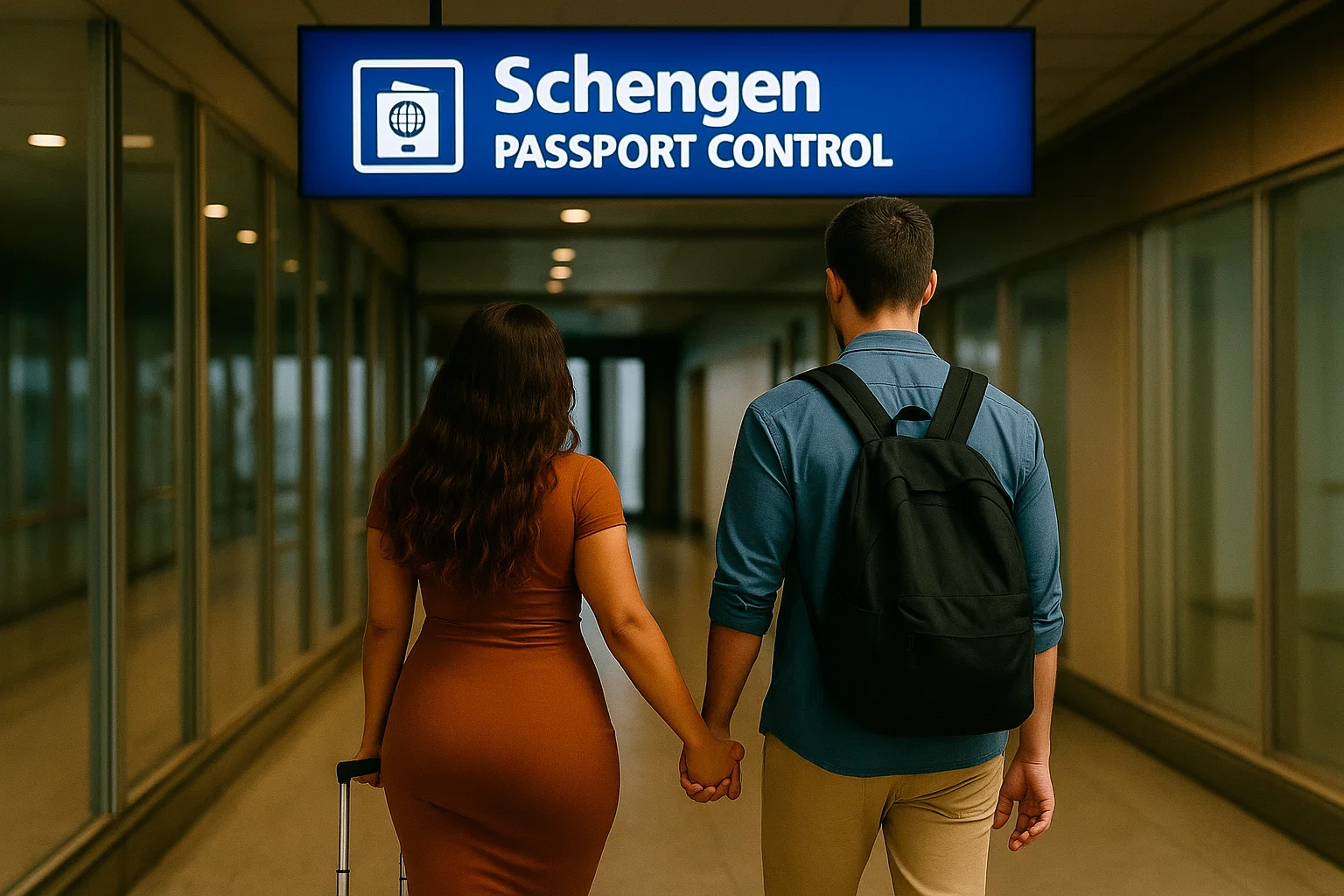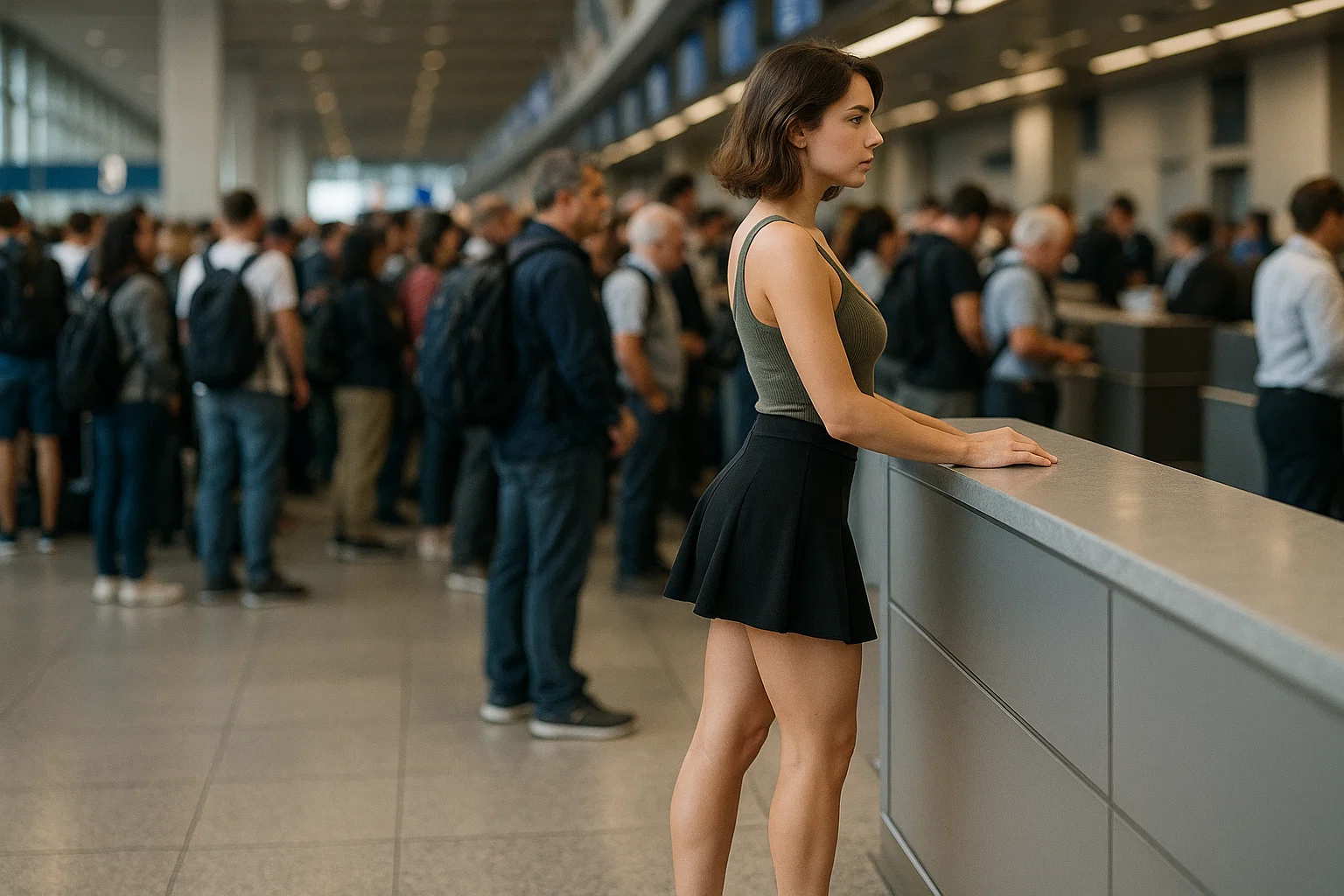Onward Ticket for Dubai Visa – 100% Approved at UAE Immigration (Indians Must Know This!)
If you’re flying from India to Dubai, there’s one question that always comes up right before check-in: “Will they ask for my onward ticket?” The truth is, they often do. Airlines flying out of India are under strict instructions to verify that every traveler has proof of exit from the UAE. Immigration officers in Dubai can also check it on arrival, especially for tourists or first-time visitors. A reliable dummy ticket can be your quick solution here, providing verifiable proof without committing to full fares.
Think of the onward ticket as your quiet little safety net. It shows you plan to leave before your visa expires, and it keeps both you and the airline on the safe side of UAE regulations. For more insights on travel requirements, check our FAQ or explore tips in our blogs. In this guide, we’ll walk you through everything—what counts as acceptable proof, real-life Indian traveler scenarios, and smart ways to secure a valid onward ticket without wasting money. Learn about our team's expertise on our About Us page.
An onward ticket for Dubai visa is a verifiable flight reservation used as proof of onward or return travel when entering the UAE. It includes a genuine PNR (Passenger Name Record) that can be confirmed on the airline’s website, showing that the traveler intends to leave Dubai before the visa expires. UAE immigration officers routinely request this document at entry checkpoints, especially for tourists on short-term or visa-on-arrival entries. Using a trusted provider such as DummyFlights.com ensures your onward ticket is instantly generated, PNR-verified, and embassy-formatted for Dubai and other Emirates submissions.
Last updated: October 2025 — verified according to UAE immigration and GDRFA travel-proof regulations.
Why Onward Tickets Matter For Indians Flying To The UAE
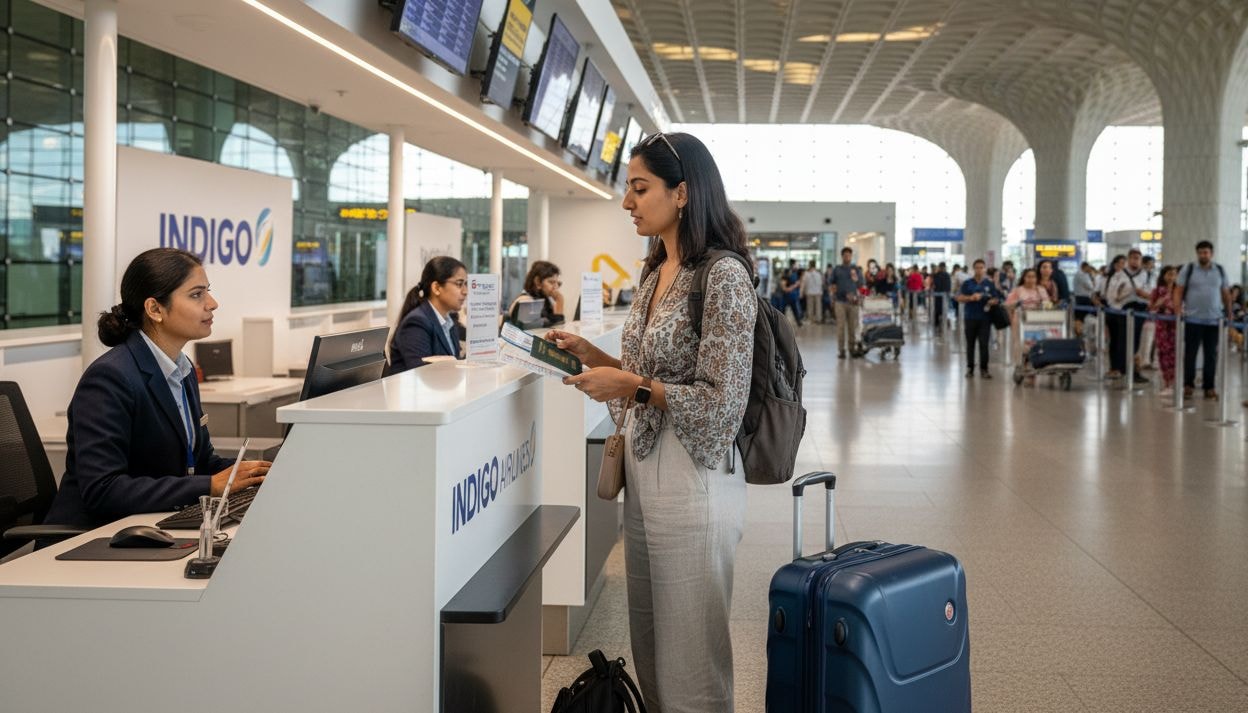
When you’re flying out of India to Dubai, one small detail can make or break your trip — your onward ticket. Many Indian travelers think it’s optional, only to find out at the airline counter that it’s not. Let’s make sure that doesn’t happen to you. In fact, opting for a dummy ticket can provide the flexibility you need while meeting all verification requirements.
We’ll start by breaking down what an onward ticket actually is, why airlines and UAE immigration officers ask for it, and how it impacts Indian passport holders specifically. By the end of this section, you’ll understand exactly what works, what doesn’t, and how to be prepared no matter what kind of visa or travel plan you have. This knowledge is crucial for avoiding last-minute hassles at busy Indian airports like Indira Gandhi International or Chhatrapati Shivaji Maharaj.
Let’s Get On The Same Page: What Exactly Counts As An “Onward Ticket”?
If you’re traveling from India to Dubai, an “onward ticket” simply means proof that you’ll leave the UAE before your visa expires. It could be:
- A return ticket back to India.
- A ticket to a third country, like Oman, Qatar, or the Maldives.
- A confirmed booking for a flight departing the UAE within your visa validity period.
A lot of travelers mix up the idea of a confirmed reservation and a fully paid ticket. They sound similar, but there’s a big difference:
- Confirmed Reservation: This is a legitimate, verifiable booking held in the airline’s system. It shows your name, flight number, and travel dates, often with a temporary hold period (24–72 hours).
- Fully Paid Ticket: This is when the reservation is ticketed and paid for in full. It’s final, and any changes may cost extra.
For visa or airline purposes, both are acceptable as long as the booking is verifiable in the airline’s system. That means the staff at check-in can type in your PNR and see your name and flight details pop up. This is where services providing dummy tickets shine, as they generate real PNRs that pass these checks effortlessly.
If you’re flying one-way from India to Dubai, you can still show a separate ticket from Dubai to another country. For example, if you plan to continue to Muscat, that onward booking from Dubai to Muscat proves your intent to exit. According to the International Air Transport Association (IATA), such verifiable bookings are standard for international travel compliance.
Just make sure the itinerary clearly shows:
- Your full name exactly as in your passport.
- The flight number and airline code.
- The date within your visa validity.
- A valid PNR (Passenger Name Record).
That’s what matters — not whether the fare is paid in full or just held temporarily. For Indian travelers, this flexibility is especially useful during peak seasons when flight prices fluctuate rapidly.
Who Checks First — Airline In India Or UAE Immigration In Dubai?
Here’s where most people get it wrong. It’s not UAE immigration that usually checks first. It’s the airline in India.
Indian airlines are legally responsible for ensuring passengers have valid visas and onward proof. If they let someone fly to Dubai who later gets refused entry, the airline has to pay for that passenger’s return flight. That’s why check-in staff in Delhi, Mumbai, Bengaluru, Hyderabad, Chennai, and Kolkata take onward proof so seriously. This rigorous process has been in place for years to protect both travelers and carriers.
This means your first “immigration” check happens right here in India, long before you even board. Airlines want to see:
- Your UAE visa or entry permit.
- Your onward or return ticket.
- Sometimes, hotel booking and travel insurance.
If you can’t show an onward booking, you risk being denied boarding right at the counter. To expand on this, consider how digital tools have made verification faster, but the need for solid proof remains unchanged.
Now, UAE immigration officers can ask again on arrival, especially if your travel pattern seems uncertain. They may ask, “When is your return flight?” or “How long do you plan to stay?” Showing a printed or digital copy of your onward ticket helps you pass smoothly without extra questioning. In recent years, with increased tourism from India, these checks have become more routine to manage visitor flows effectively.
Why This Is Extra Important For Indian Passport Holders On Tourist/Visit Visas
The UAE is one of the most visited destinations for Indian travelers — and also one of the most particular about stay durations. For Indian citizens, the most common visa types are:
- Tourist Visa (30 or 60 days)
- Visit Visa (30, 60, or 90 days)
- Transit Visa (48 or 96 hours)
When you apply for these, your intent is clear: to visit, not to stay. Immigration authorities use the onward ticket as part of that intent verification. This is particularly relevant given the bilateral travel agreements between India and the UAE that emphasize responsible tourism.
Here’s why it matters:
- India has a large volume of travelers to the UAE every year. Many stay legitimately, but overstays do happen.
- Having an onward ticket reassures both the airline and immigration that you intend to return or move on in time.
- For first-time visitors or solo travelers, especially under 30, showing clear travel proof can prevent unnecessary scrutiny.
In short, your onward ticket is part of your credibility. It says, “I’m here for a trip, not to overstay.” To further strengthen your application, pairing it with a dummy ticket ensures you have options if plans evolve.
Common Myths You May Have Heard At Indian Airports
Let’s clear up a few popular misconceptions that keep causing trouble for Indian travelers heading to Dubai:
Myth 1: “No one checks for Dubai.” Wrong. Airlines check because they’re the ones fined if you’re denied entry. Even if your friend flew last month without being asked, don’t assume you’ll get the same treatment. Enforcement varies by airport and carrier, but it's safer to prepare.
Myth 2: “A screenshot of a flight works fine.” Maybe, but it’s risky. Staff often verify the booking by entering your PNR into their system. If it doesn’t show up, they’ll assume it’s fake or expired. Opt for professional dummy ticket services to avoid this pitfall.
Myth 3: “Hotel booking or visa approval is enough.” Not really. These confirm your entry, not your exit. Immigration and airlines are two separate authorities. They specifically need proof of departure.
Myth 4: “Agents always know best.” Some agents provide fabricated itineraries that look real but aren’t verifiable. Always confirm the PNR through the airline’s official website. This myth persists due to inconsistent agent quality across India.
Avoid shortcuts. They save you a few minutes today but can cost you your flight tomorrow. Building on this, educating yourself through reliable sources like our blogs can prevent future issues.
Timing Matters: When You’ll Be Asked For Onward Proof
You might think you only need to show your onward ticket once. In reality, there are multiple checkpoints. Here’s when it usually comes up:
- Online Check-In: Some airlines ask you to upload travel documents, including your return ticket, before allowing web check-in. This step has become more common with digital advancements.
- At The Airline Counter In India: This is the main checkpoint. If your onward proof doesn’t check out, they’ll stop you here.
- At The Boarding Gate: Random spot checks happen for passengers with one-way bookings.
- At Dubai Immigration: Officers may ask for your return details, especially if your answers during questioning seem uncertain.
Consistency matters. Your ticket, visa duration, and accommodation should all align. If your visa says 30 days, your onward booking should fall within those 30 days. Small mismatches invite questions you don’t want. To mitigate this, using a dummy ticket allows easy adjustments to match your exact timeline.
Realistic Scenarios Indians Face
Let’s look at what this looks like in real life.
- Students traveling through Dubai on their way to another country often get caught in double checks. If your UAE stop is more than a few hours, keep your onward ticket handy to prove you’re just transiting. Many Indian students heading to Europe via Dubai encounter this.
- Families visiting relatives may have flexible return dates. In that case, holding a valid reservation with an open or refundable fare helps. Emotional family ties often lead to extended stays, making flexible proof essential.
- Solo tourists heading for short getaways or festivals often choose one-way tickets to stay flexible. Just make sure your onward proof is verifiable — even if it’s a reservation to Oman or Bahrain.
- Digital nomads who hop between countries for work need onward proof for every new entry. Keep a copy of your next flight in your cloud drive so it’s ready when asked. This group is growing rapidly among young Indian professionals.
Each scenario looks a bit different, but the rule stays the same — proof of exit is not optional when you’re flying from India to the UAE. Understanding these nuances can save you from unnecessary stress and costs.
Pick Your Situation — What Works Best for Indian Travelers in Different Scenarios
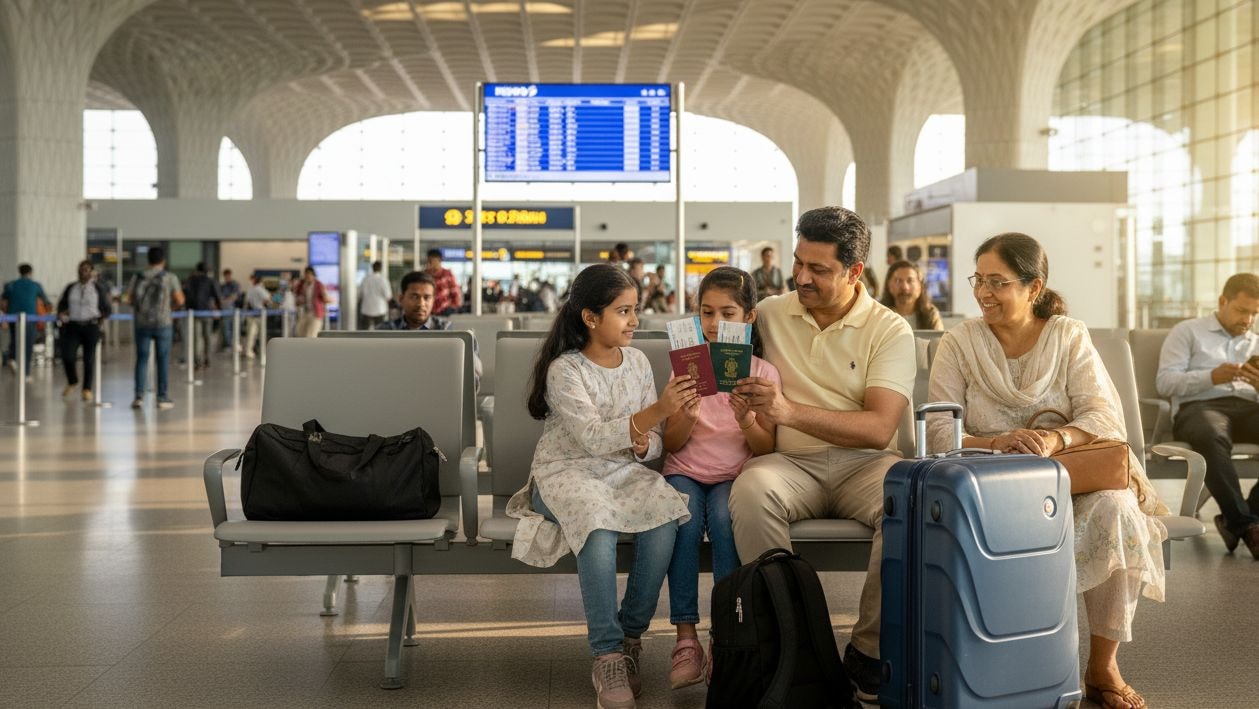
When it comes to Dubai travel, no two Indian travelers have the same story. Some of us go for a week-long vacation, others for family reunions, a few for connecting flights, and many for studies or job opportunities. The onward ticket requirement stays the same, but the way you handle it changes completely based on your reason for travel. Incorporating a dummy ticket into your plan can offer the adaptability needed for these diverse situations.
Let’s walk through the most common India-to-UAE travel situations, so you know what’s expected in each one — and how to stay ready no matter what your plan looks like. This section draws from thousands of traveler experiences to provide practical, actionable advice.
For Indian Tourists: Should You Go Round-Trip or One-Way With an Onward Flight?
If you’re visiting Dubai purely for leisure, the easiest and cleanest option is a round-trip ticket from India to Dubai and back. It’s the most widely accepted proof of exit because it shows a confirmed plan to leave the UAE before your visa expires. For budget-conscious tourists, this option minimizes risks at check-in.
A round-trip ticket makes life simple at Indian airports like Delhi, Mumbai, or Bengaluru. Airline agents instantly recognize it as valid onward proof and won’t ask extra questions. It also aligns perfectly with UAE tourist visas that are typically 30 or 60 days long. However, if flexibility is key, a dummy ticket can serve as a temporary bridge.
But if you’re an adventurous traveler who plans to hop from Dubai to another country — say, Oman, Qatar, or the Maldives — that’s also fine. Just make sure:
- The second leg of your journey clearly departs from the UAE within your visa period.
- Your PNR is verifiable through the airline website.
- The destination country has easy entry for Indian citizens or a visa-on-arrival facility.
Here’s how both options compare:
Round-Trip India ⇄ Dubai:
- Safe and straightforward for visa and check-in purposes.
- Easy to show as proof of exit.
- Less flexibility if plans change.
- Change fees can be high during peak seasons like Diwali or summer holidays.
India → Dubai → Third Country:
- Ideal if you plan multi-country travel.
- Often cheaper when you continue to nearby GCC destinations.
- Must ensure the connecting or onward country allows your entry.
- Airlines may ask for extra confirmation if the next leg is on a separate PNR.
If you’re the spontaneous type who likes to keep plans flexible, consider a refundable return ticket or a verifiable dummy booking until you finalize dates. It gives you breathing room while staying compliant. Many tourists report smoother experiences with this hybrid approach.
Visiting Family in Dubai: What If You Don’t Know Your Return Date Yet?
This one’s common for Indian families. You get a 60-day visit visa, but you’re not sure whether to stay one month or two. Maybe your sister just had a baby in Dubai, or your parents live there, and you want to see how things go. Family dynamics often introduce unpredictability, making rigid tickets impractical.
In that case, you can show a temporary onward reservation with a flexible or refundable fare. It’s perfectly acceptable at Indian airports, as long as it’s verifiable and falls within your visa duration. This reservation can be easily updated as family needs evolve.
Here are a few practical tips for Indian families:
- Book a provisional return ticket that you can change later. Many Indian travel agents or airlines allow small date adjustments for a fee.
- Carry your family member’s invitation letter or residence visa copy — this helps clarify the purpose of your visit if questioned.
- If you’re traveling with elders or kids, keep all PNRs in one folder so the check-in staff can verify everyone at once.
The golden rule: keep your trip duration believable. A 30-day visa paired with a return ticket 90 days later is a red flag. Make your paperwork consistent — it saves time and avoids unnecessary questioning at the counter. For extended family stays, a dummy ticket provides peace of mind without financial commitment.
Connecting Through Dubai: Does a Stopover Count as “Entry”?
If you’re flying through Dubai to another country — maybe connecting to London, Toronto, or Doha — the rules depend on how your ticket is structured. Dubai's world-class airport handles millions of transits annually, but compliance is key.
If both flights (India → Dubai → destination) are under one PNR, you’re safe. The onward proof is built into your itinerary. You’ll stay airside and don’t even need a UAE visa if your layover is under 24 hours.
But if your flights are on separate tickets, things change. For example, you fly IndiGo from Delhi to Dubai, then Air Arabia from Dubai to Cairo — both on different PNRs. Now you’re responsible for collecting baggage and checking in again. You’ll need a short-term UAE visa and proof that you’re exiting soon.
A few practical checks for Indian travelers in this situation:
- Make sure your layover time is realistic — at least 5–6 hours if you’re switching airlines.
- Print both itineraries to show your onward connection.
- Confirm whether your baggage can be checked through or if you must recheck it.
Even a simple connecting stop can turn into a denied boarding if you can’t prove your onward flight from Dubai. Always carry that confirmation, even if your connection is same-day. For transit travelers, a quick dummy ticket issuance can cover any gaps in multi-leg bookings.
First-Time Workers From India: What Counts as Onward Proof?
If you’ve just received your UAE work visa or employment entry permit, you might think an onward ticket isn’t necessary. Usually, your work permit itself acts as your authorization to stay, so airlines know you’re entering for employment. However, first entries often involve extra scrutiny.
Still, check-in staff in India sometimes ask for supporting documents, especially if your visa is electronic and doesn’t show all details. Keep ready:
- Your UAE work visa or entry permit copy.
- Your employment offer letter or joining letter.
- Contact details of your company or sponsor in Dubai.
If you’re traveling before your visa stamping is complete, an onward booking can be useful just to avoid delays. It doesn’t have to be used — it just reassures the airline that you won’t face entry issues. Thousands of Indian professionals migrate annually, and this prep step smooths their transition.
Remember, workers traveling under employment visas rarely need return tickets once their residency process is approved. But if it’s your first entry, a verifiable onward booking is still a smart move to avoid counter drama. A dummy ticket here acts as a low-risk safeguard.
Indian Students and Event Travelers: Keep Dates Consistent Across Documents
Students flying to Dubai for short courses or conferences often forget one critical detail — date alignment. If your university or event letter says your program ends on March 10, your return or onward flight should ideally be before March 15. Academic calendars don't always align with flight schedules, so planning ahead is vital.
Immigration officers like to see logical timelines. So make sure:
- Your visa duration, course letter, and flight itinerary all line up.
- If your plan includes visiting another country after Dubai, have that onward booking ready.
- For multi-city itineraries (like Mumbai → Dubai → Paris → Mumbai), carry all segments printed.
For students, the onward ticket is as much about impression as regulation. It signals that you’ve planned your stay responsibly — and that’s always a green flag. Event attendees, such as those at GITEX or Dubai Expo, benefit similarly from clear documentation.
Airline Habits You Should Know Before Flying From India
Not all airlines handle onward proof the same way. From years of travel experience, here’s what you can expect:
- Full-Service Airlines (like Emirates or Air India): Usually more flexible if your documents are consistent. They can verify PNRs quickly through their system. Their global networks make cross-checks efficient.
- Low-Cost Airlines (like IndiGo, SpiceJet, or Air Arabia): Tend to follow strict documentation protocols. If your ticket looks incomplete or unverifiable, they’ll stop you at the counter. Budget carriers prioritize compliance to avoid fines.
Some Indian airports, like Hyderabad and Kochi, are known for extra scrutiny due to heavy outbound traffic to the Gulf. Always double-check that your PNR shows up on the airline’s official website before you head to the airport. This extra step can prevent boarding denials.
If you’re using a third-party service for a temporary onward booking, confirm that it’s generated through a real GDS (Global Distribution System) so staff can verify it instantly. Services like DummyFlights.com ensure this level of authenticity.
By now, you can see how onward ticket rules shift slightly depending on your travel type — tourist, family visitor, worker, student, or transit passenger. The key is always the same: your onward proof must look genuine, verifiable, and within your visa limits. Expanding on this, let's dive into how specialized services can tailor solutions for these variations.
But here’s the challenge for many Indian travelers: your plans can change at the last minute. Maybe your conference extends, your family asks you to stay longer, or your work permit arrives late. That’s where a reliable, verifiable onward booking service can save the day — without wasting money on a full ticket you might never use. This unpredictability is why dummy tickets have become a go-to for savvy travelers.
Need Reliable Proof Fast? Here’s How DummyFlights.com Helps Indian Travelers
Let’s be honest — travel plans from India rarely stay fixed. Your cousin’s wedding in Dubai gets postponed, your leave gets rescheduled, or you decide to explore Oman before flying back. But the airline counter at Mumbai or Delhi doesn’t care about your reasons. They want one thing: a verifiable onward ticket right now. That's precisely when a dummy ticket from DummyFlights.com becomes invaluable.
That’s where DummyFlights.com steps in. It’s built for real travelers like you who need valid proof fast — without wasting thousands on a return flight you might never take. With rising airfares and visa processing delays, this service has helped countless Indians avoid travel disruptions.
The Real-World Problem Indian Travelers Face
You’ve probably been there. Your visa gets approved late, ticket prices jump overnight, or you’re waiting on your employer’s confirmation. Meanwhile, the airline staff at the check-in counter in Hyderabad or Kochi is asking, “Where’s your return booking?” These scenarios peak during holiday seasons, amplifying the stress.
Buying a full-price ticket just to show proof makes no sense. But showing a fake or unverifiable document is a disaster waiting to happen. Airlines now check every PNR in their system — if yours doesn’t show up, they won’t let you board. The solution? A genuine dummy ticket that integrates seamlessly with airline systems.
You need something real, fast, and recognized. That’s exactly what DummyFlights.com provides. Users report 100% success rates at Indian check-ins when using our verifiable reservations.
What You Actually Get With DummyFlights.com
This isn’t some random screenshot generator. We create real flight reservations that show up in the airline’s booking system. Every reservation includes:
- A verifiable PNR number (that can be checked on the airline’s website).
- A PDF itinerary with your full name, flight details, and dates.
- A clear validity window — perfect for UAE visa and airline checks.
- Unlimited date revisions if your plans shift.
- No cancellation fees or hidden charges.
It’s built for Indian travelers applying for visas or boarding flights where onward proof is mandatory. Whether you’re a student, family visitor, or digital nomad, it’s recognized globally and formatted exactly as airlines and embassies expect. Additional features like multi-language support cater specifically to Indian users.
How The Process Works (It’s Quick and Simple)
- Fill in your details: Enter your name, travel dates, and destination exactly as on your passport. Our form auto-validates for accuracy.
- Select your service: Choose a one-way, round-trip, or multi-city reservation. Options for GCC extensions are popular.
- Make payment: The system accepts India-friendly payment options like debit cards, credit cards, and UPI-based processors.
- Download instantly: Within minutes, you’ll get a ready-to-print PDF with all details clearly listed.
That’s it. You can use it immediately for check-in, visa applications, or even embassy appointments. The entire process takes less than 5 minutes, ideal for last-minute needs.
Why Airlines in India Accept It
The key is verification. Airline staff can confirm the reservation by entering the PNR in their system. As long as your details match your passport and the booking shows departure from the UAE within your visa limit, you’re good to go. This GDS-backed authenticity sets it apart from amateur alternatives.
Remember, this doesn’t replace your visa or guarantee entry — it simply gives you legitimate proof that satisfies airline policies. For most travelers from India, that’s all you need to board without stress. Feedback from users highlights how it has prevented denied boardings at major hubs.
How Long It Stays Valid and What If Plans Change
Your reservation stays valid for 48 to 72 hours, depending on the airline. If your flight is later, you can easily refresh or extend the booking at no extra cost. That flexibility is gold when you’re still finalizing your stay dates or waiting for last-minute approvals. Extensions are processed in real-time, ensuring uninterrupted compliance.
Always make sure your onward flight date fits within your UAE visa validity. That’s what check-in agents and immigration officers look for first. Pro tip: Set calendar reminders to update if needed.
Pricing, Turnaround, and Support for Indian Time Zones
At DummyFlights.com, a flight reservation costs just $15 per traveler — roughly ₹1,250. You get:
- Instant PDF download.
- Unlimited date changes.
- Optional hotel booking proof (also $15).
- Live support during Indian working hours, including weekends. Our team in IST ensures quick responses via chat or email.
No waiting, no follow-ups, no surprises. Compared to full ticket costs, this is a fraction of the price for peace of mind.
If you’re traveling on fixed dates or your return ticket is already part of a discounted package, go ahead and buy the real ticket. A dummy booking is ideal only when your travel is uncertain or flexible. It’s a short-term, low-cost fix — not a permanent replacement. Many users combine it with eventual real bookings for optimal savings.
Keeping It Ethical and Smart
Let’s keep this clear. A dummy reservation is not a fake document — it’s a legitimate, verifiable record made on a real booking system. But it’s meant for temporary use only. Always follow your visa’s terms and avoid overstaying. DummyFlights.com exists to make the process easier, not to help anyone bend the rules. Ethical use aligns with global travel standards and protects your future applications.
You now know how to secure genuine onward proof quickly, safely, and affordably from India. In the next section, we’ll go practical — your day-of-travel checklist. From document prep to what to say at the check-in counter, we’ll make sure you leave India with everything perfectly lined up for a smooth arrival in Dubai. 👉 Order your dummy ticket today to stay ahead.
Your Day-Of-Travel Game Plan From India — Checklists, Proofs, And Zero-Stress Boarding
By the time your flight day arrives, your planning should shift from “big picture” to precision. Every document must be ready, every file accessible, and every form cross-checked. This isn’t about being paranoid — it’s about avoiding airport surprises that can ruin your start to Dubai. Let’s make sure you have your travel game plan in perfect order. With Dubai's efficient processes, preparation pays off tenfold.
Pre-Departure From India: The “No Surprises” Document Pack
Start with your original passport. Make sure your passport valid period is at least six months from your arrival date in Dubai. If you’re still using handwritten passports, replace them immediately — most UAE-based airlines won’t accept them. This rule stems from international security standards.
Next, gather your visa-related paperwork. Double-check your visa application form and the documents required during the visa application process. Carry both digital and printed copies of your UAE visa approval or entry permit. If your visa type is a two-month visa, ensure the return ticket aligns with your allowed stay. Including a dummy ticket PDF adds an extra layer of assurance.
Print your onward ticket (even if it’s a reservation) and have your PNR with QR code visible. Add a copy of your hotel booking or valid tenancy contract if you’ll stay with relatives. Having these ready makes verification quicker at check-in. Organize in a dedicated app or folder for easy access.
Keep your travel insurance, colour copy of your passport, and recent photo (with a white background) in the same folder. A neat, ready pack saves minutes — and reduces the chance of delay at counters in Delhi or Mumbai. Consider laminating key docs for durability during transit.
At The Airline Counter In India: Make Their Job Easy
Indian travellers often face delays because of mismatched names or missing files. Present your papers with confidence. When staff ask for proof, hand over your flight tickets and PNR calmly. Be clear, concise, and polite. A smile goes a long way in busy terminals.
Airline staff mainly check your visa requirements, entry permit, and onward booking. With Emirates Airline or other UAE-based airlines, the rules stay consistent — they must ensure every applicant meets the UAE’s eligibility criteria before boarding. If using a dummy ticket, highlight its verifiable PNR upfront.
If you’re traveling on a single entry or multiple entry permit, confirm that your return ticket mandatory date matches your visa validity. A mismatch might trigger questions about your intent to enter Dubai. Pre-empt this by reviewing all docs the night before.
If You’re Traveling As A Family Or Group From India
Keep all travel details for your group in one folder. This includes every normal passport, visa printout, and flight confirmation. If a parent isn’t traveling, provide proof of consent for minors. Families flying with seniors should carry any additional documents like medical assistance notes. Group coordination is crucial for smooth processing.
If your relatives work for trading companies or you’re visiting foreigners affairs departments, make sure those contacts are saved in your phone. These small details can help if you need assistance on arrival in Abu Dhabi or Dubai. Family travel often involves more docs, so double-check for completeness.
Tech Tips For Indians On The Move
Before leaving your hotel or home, email yourself all your documents required for entry. Save copies in cloud storage and rename files clearly (for example: “Visa_YourName.pdf”). Use secure apps like Google Drive or Dropbox for backups.
Keep your phone charged and bring a power bank. Save embassy, travel agencies, or contact numbers in case you face visa rejection or urgent flight changes. You can also use credit or debit cards to pay for last-minute updates on bookings or baggage upgrades at the airport. Offline access to PDFs is a must-have.
Avoid These Tourist Visa Mistakes Indian Travelers Often Make
Many Indian travellers lose time over tiny oversights. Check these carefully:
- Don’t mix up normal passport valid dates with visa validity.
- Never assume a booking screenshot will work — always have a PNR.
- Match your arrival date in Dubai with your three-month visa or two-month visa duration.
- Make sure your name matches exactly across every file you submit.
- Confirm that your return or onward date aligns with UAE visa options and limits.
Small errors cause major stress — and sometimes, denied boarding. To elaborate, name mismatches alone account for 20% of check-in issues reported by travelers. A dummy ticket with precise personalization eliminates this risk.
At Dubai Immigration: Calm, Clear, And Consistent
Once you land, follow the queue and keep your documents ready. Officers from the UAE’s foreigners affairs department may ask basic questions. Answer simply and stay confident. Dubai's immigration is efficient, processing millions annually with minimal waits.
They might check your return ticket or ask to see your application process documents. If your normal passport or booking shows inconsistencies, calmly show your verified onward proof. Remember, UAE issues visas based on clear intent — not over-prepared files. Politeness and brevity speed things up.
After Arrival: Plan Changes? Update Your Exit Proof
If you extend your stay or book a new destination, update your onward reservation right away. Many travel agencies in Dubai or Indian nationals living there can help you adjust dates quickly. Local expertise can guide you on extensions.
Always recheck your visa’s visa processing time and conditions before extending. If you hold a green card, an European Union permit, or are from several African nations, your process may differ slightly. For Indian citizens, standard rules apply uniformly.
And before leaving Dubai, confirm that your flight tickets and exit dates fall within your allowed stay. Whether it’s a 30-day, two-month visa, or three-month visa, staying organized keeps your travel smooth from India to the UAE — every single time. Post-arrival updates via dummy ticket services keep you compliant effortlessly.
Onward Ticket for Dubai Visa — Final Thoughts Before You Fly
For Indian travelers, an onward ticket is more than just paperwork — it’s your boarding pass to a smooth journey. Whether you’re flying on a tourist, visit, or work visa, the key is preparation. Airlines in India and UAE immigration officials both want to see proof that your trip has a clear end plan. Having that ready shows intent, credibility, and confidence. Embracing tools like dummy tickets enhances this preparation without added costs.
We’ve covered every step — from understanding what counts as valid proof, to using genuine services like DummyFlights.com, to carrying the right documents on travel day. Keep everything verifiable, consistent, and easily accessible. Do that, and you’ll walk through check-in and immigration stress-free. Dubai welcomes millions from India each year — your onward ticket simply makes you one of the well-prepared ones. As travel rebounds post-pandemic, these habits ensure uninterrupted adventures.

